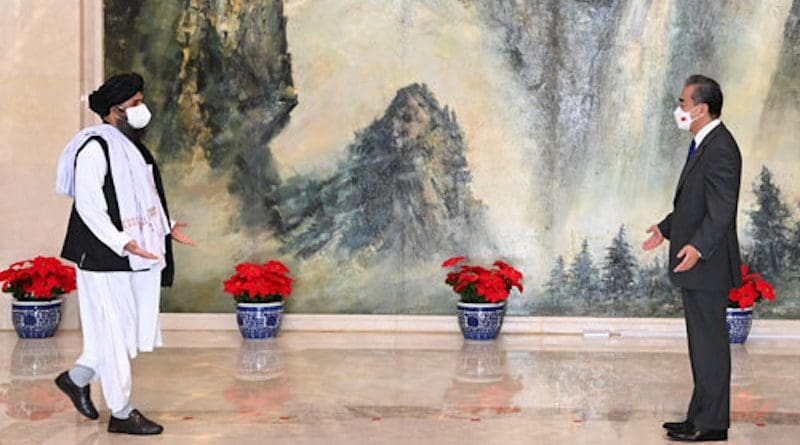Taliban Rule In Afghanistan Adds To Fears Of China’s Uyghurs
By RFA
The Taliban’s takeover of Afghanistan has made Uyghurs and other Turkic Muslims in Xinjiang region fearful that China will use the turmoil in Kabul to double down on the repressive policies that have drawn international condemnation and genocide accusations, activists and analysts said.
Following the pullout of U.S. forces, Taliban militants swept across Afghanistan, seizing control of the government as President Ashraf Ghani and thousands of civilians fled for safety, fearing a return to the harsh brand of Islamic rule the group imposed when it ruled the county in the 1990s.
China has voiced concern that renewed Taliban rule and its impact on the restive Xinjiang Uyghur Autonomous Region (XUAR), where authorities have over the past decade imposed wave upon wave of repressive measures it says are aimed at combatting religious extremism and terrorism in the region.
In one sign of Beijing’s concern, China conducted antiterrorism military drills starting on Wednesday with Tajikistan, which shares long borders with the XUAR and with Afghanistan. The XUAR shares a 57-mile (90-km) border with Afghanistan.
While Beijing has yet to formally recognize the Taliban regime as the Afghan government, Chinese Foreign Minister Wang Yi hosted the group’s co-founder, Mullah Abdul Ghani Baradar, for talks in Tianjin in late July.
Advocacy groups say they are fearing the worst for Uyghurs, who have since 2017 been the target of a systematic assimilation campaign of forced birth control and sterilization, forced labor at factories and farms, and mass incarceration that has sent as many as 1.8 million Uyghurs through a network of internment camps.
“The Taliban takeover of Afghanistan may be an ominous sign for the Uyghurs,” said Ilshat Hassan, director of China affairs at the Germany-based World Uyghur Congress.
He pointed to an incident in December, when the U.S.-backed Afghan government quietly detained 10 Chinese nationals whom Kabul said were linked to Chinese security agencies and appeared to be attempting to create a fake East Turkestan Islamic Movement (ETIM) cell in Afghanistan in an effort to entrap Uyghurs.
China regularly refers to Uyghur activists in exile as members of the ETIM as part of a bid to discredit their claims of rights abuses in the XUAR.
In October, however, the U.S. State Department weakened the antiterror pretext for the crackdown on Uyghurs when it removed the ETIM from its designated terrorist list. A U.S. official told RFA the group was delisted because “for more than a decade, there has been no credible evidence that the ETIM continues to exist.”
Hassan believes “it’s not a stretch to say” that China could take advantage of the new situation and use ties cultivated with the Taliban to try the ruse again.
“The current Taliban government, which hates America, is eager to cozy up to China,” he said. “Under such circumstances, the probability of sudden appearance of a fake ETIM cell operating in Afghanistan purportedly against China just as the CCP wished isn’t too distant.”
No excuse needed
Though the ETIM almost certainly no longer exists, Beijing will mount a campaign to convince the world, or at least the Chinese, that it still does, said respected commentator and China watcher Gordon Chang.
“China’s leadership, always concerned about legitimacy, likes to show it has justification for its horrific actions,” he said in an email to RFA.
“China’s regime has, so far, gotten away with genocide and other crimes against humanity committed against Uyghurs, Kazakhs, and other Turkic minorities, so in one sense Beijing does not need an excuse for further measures,” added Chang.
Political analyst Bradley Jardine says the Chinese government had hedged its bets in order to work with any future Taliban government, posing dangers for Uyghurs.
Uyghurs are concerned that the Taliban will obtain records with their seizure of government buildings, giving China access to identification cards that they would use to have Uyghurs living in Afghanistan deported back to China, he said.
“Historically, the Taliban have tried to move Uyghur populations in Afghanistan to monitor them,” said Jardine, a scholar at the Kissinger Institute on China and the United States at the Wilson Center in Washington.
“There are also cases of the Taliban deporting Uyghurs from the regions that they’ve controlled in Afghanistan.”
About 3,500 Uyghurs live in Afghanistan, according to the Joshua Project website on ethnic and religious minorities run by the U.S.-based missionary group Frontier Adventures.
Omer Kanat, executive director of the Uyghur Human Rights Project (UHRP), said that Afghanistan and Pakistan were becoming Chinese client states whose help for Beijing imperils Uyghurs
“At the behest of the Chinese authorities, Islamabad and Kabul are engaged in the harassment, detention, and deportation of vulnerable Uyghurs,” he said in a statement released last week for a report on how the Chinese government surveils and threatens Uyghur communities in Afghanistan and Pakistan.
“Some of the targeted Uyghurs have been tortured and executed in China, while others have experienced the breakup of their families and heavy-handed surveillance of their communities. China’s economic largesse can buy all sorts of complicity in violence against Uyghurs.” he said.
The UHRP expressed concern that China will again use a global event as a pretext for repressive policies targeting Uyghurs.
“This was made no clearer in the wake of the 9/11 attacks on the United States when China claimed it faced a comprehensive Uyghur terror threat,” said Kanat. “Twenty years later, the amplification of this claim has become the justification for genocidal policies.”
Reported by Kurban Niyaz for RFA’s Uyghur Service. Translated by Alim Seytoff. Written in English by Roseanne Gerin.

